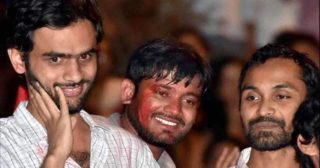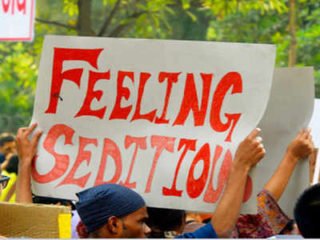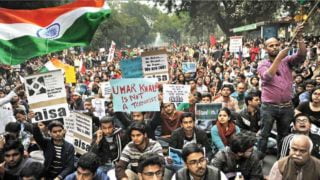The Delhi Police filed a chargesheet against Kanhaiya Kumar for sedition for the JNU Sedition case that happened 3 years ago. (In)Famously called the ‘Kanhaiya Kumar Case’, it has become a favorite of the so called nationalists, communists, liberals and fundamentalists alike.
What is the Kanhaiya Kumar case?
Kanhaiya Kumar was the president of the Jawaharlal Nehru University Students’ Union in Febuary 2016 when a protest march was held in JNU to commemorate the hanging of Parliament attack convict Afzal Guru.
Videos of this event were circulated where the students were seemingly shouting anti-national slogans.
The police registered a case against Kanhaiya Kumar for sedition and he was arrested. Later, his associates, Umar and Anirban were also arrested.
After examining these videos, it was revealed that videos shown by some news channels were doctored (morphed or simply, a different audio pasted on a different video). When news channels broadcasted them, the issue reached our drawing rooms and Kanhaiya Kumar became the focal point of freedom of expression vs nationalism debate.
Also, in these videos he is not seen sloganeering, he constantly said that he rushed to the event because someone informed him of clashes and being the President it was his duty to be present there.
Soon the court granted interim bail (of 6 months) to Kanhaiya Kumar, later he and his associates were granted regular bail.
Now, almost 3 years later, Delhi police filed a 1200 page chargesheet against 10 people – Kanhaiya Kumar, Umar Khalid and Anirban Bhattacharya and 7 Kashmiri students.
The Charge of Sedition
Kanhaiya Kumar and his associates were charged with sedition this whole time.
So what is sedition?
The term ‘Sedition’ in law books mean “conduct or speech which results in mutiny against the authority of the state”. This dissent suppressing language was used by the imperial British powers.
Sedition Law – Section 124a in the Indian Penal Code- makes “words, either spoken or written, or by signs, or by visible representation, or otherwise, brings or attempts to bring into hatred or contempt, or excites or attempts to excite disaffection towards the government” punishable by law, a fine and a maximum punishment of life imprisonment.
Also Read : JNU Crackdown Resumes, Did The JNU GSCASH Really Deserve To Be Scrapped ?
Sedition and Democracy
The presence of a law that was used in colonial times to suppress the voice of dissent (of Indians) raises several questions in my mind. The Britishers constantly used the law against Indian political leaders seeking independence. Even Mahatma Gandhi was once charged with sedition. In my opinion, Sedition Law inherently contradicts the nature of the Indian democracy.
Sedition also contradicts Freedom of Expression which is our Fundamental Right. But Fundamental Rights too have some reasonable restrictions. These restrictions include inciting the mob and threatening the security of the state. The students are free to shout anything, anywhere, but while staying within the reasonable limits.
About the Trial
While there is little evidence against Kanhaiya Kumar, evidences of posters, pamphlets and plans of organizing the event have been found with his associates. The accused have rightly shown their faith in the judiciary for an unbiased trial and of a right interpretation of the ambiguous Sedition law.
Many question the sudden break from slumber of the Delhi Police when general elections are 3 months away while Kanhaiya suspects a political motive behind it. This JNU sedition case is said to be a desperate attempt of the ruling regime to woo its loyalists after raising the Ayodhya Mandir/Masjid issue, 10% Economically Backward Upper Caste Reservation and dozens of nationalist propaganda.
If these students did commit a crime, they must be punished. But if means are as important as goals, the concerned authorities must do so while producing the right evidences and incurring the violation of the right laws, both at the right time.
Image Credits: Google Images
Sources: Indian Express, An Era of Darkness, Scroll.in
Find the blogger @parihar_tweets
You’d also like to read:


































